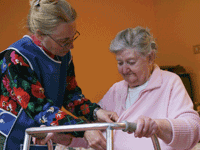
Human rights protections should be extended to publicly-funded users of private home care services, the Equality and Human Rights Commission has urged after finding widespread abuses in the sector.
Its inquiry into human rights for older people in domiciliary care services recommends closing the loophole whereby publicly-funded users of independently-run care homes are covered by the Human Rights Act 1998, but not state-funded users of independent home care services.
If enacted, it would mean providers would have an additional duty to protect human rights and would provide users and families with legal redress if they believed their rights were being breached.
Its year-long probe uncovered many instances of rights being breached including disregard for privacy and dignity when carrying out intimate tasks, neglect due to care packages not being carried out, often due to lack of time, and inadequate support to eat and drink.
It said the abuses arose from a failure to apply a “human rights approach” to home care.
While calling for providers to be bound by the Human Rights Act, it also raised significant concerns about commissioning, identifying a “patchy understanding” among councils of their human rights obligations.
It slammed commissioning practices driven by price, which resulted in shortened care visits and increased risks to human rights, and contracts with providers based on delivering tasks for defined time periods, rather than person-centred care.
Most of the older people interviewed by the inquiry said they had little or no choice over what support they received or the timing of visits.
The review also found that older people were not supported to raise concerns or make complaints about services and many did not know how to.
It said councils needed to do more to incorporate human rights into their commissioning and also help service users to make complaints and raise concerns.
“This is not about burdensome red tape, it is about protecting people from the kind of dehumanising treatment we have uncovered,” said EHRC commissioner Baroness Sally Greengross. “The emphasis is on saving pennies rather than providing a service which will meet the very real needs of our grandparents, our parents, and eventually all of us.
The United Kingdom Homecare Association welcomed the EHRC report, and said it should be a “wake-up call” for councils about underfunding of care.
“Examples of poor practice in the EHRC report are troubling,” said UKHCA chief executive Bridget Warr. “However, the commission has rightly concluded that many of the problems are largely caused by inadequate commissioning of home care by local councils, who fund and arrange the majority of social care.”
However there are doubts whether extending the Human Rights Act to private providers would lead to improvements.. Martin Green, the chief executive of the English Community Care Association, said the extension of the Human Rights Act to independent care homes in 2008 had had no impact.
“I wonder what the purpose of this is because I don’t think the EHRC has articulated what they think the benefits of this are,” he added.
“There is a good case to be made for bringing home care services within the purview of the Human Rights Act, as are residential services already,” said Association of Directors of Adult Social Services president Peter Hay. “But while what may be a fairly protracted discussion concerning that continues, there can be no substitute for constant vigilance by users, families, carers and social care staff. And robust and effective inspection by the CQC.”
Some of the problems identified in the report could be tackled by greater access to personal budgets for older people, said Karen Garner, founder of independent care management service My Care Umbrella.
“With the power of a personla budget people can rid themselves of rigid care plans and ask carers to take a more personalised approach,” she said. “Older people can develop their own home care arrangements with providers that support and retain their staff, so the same carer turns up week on week.”
What do you think?Join the debate on CareSpace
Keep up to date with the latest developments in social care. Sign up to our daily and weekly emails
Related articles


 ‘Dear Sajid Javid: please end the inappropriate detention of autistic people and those with learning disabilities’
‘Dear Sajid Javid: please end the inappropriate detention of autistic people and those with learning disabilities’ Ofsted calls for power to scrutinise children’s home groups
Ofsted calls for power to scrutinise children’s home groups Seven in eight commissioners paying below ‘minimum rate for home care’
Seven in eight commissioners paying below ‘minimum rate for home care’ Children and young people with SEND are ‘valued and prioritised’ in Wiltshire, find inspectors
Children and young people with SEND are ‘valued and prioritised’ in Wiltshire, find inspectors 
 Facebook
Facebook X
X LinkedIn
LinkedIn Instagram
Instagram
Comments are closed.